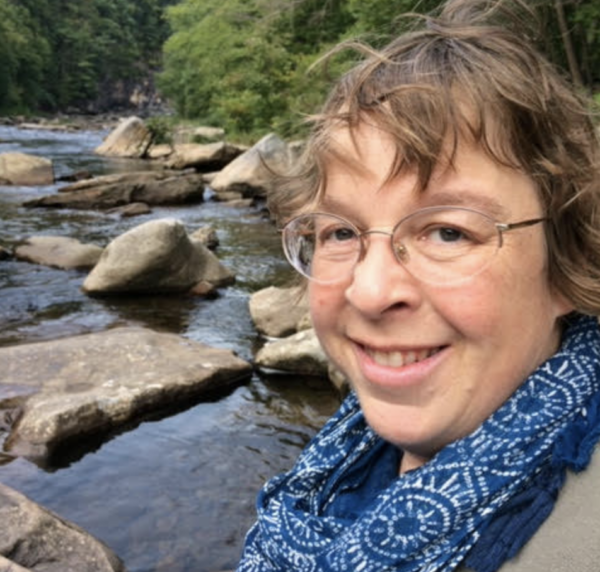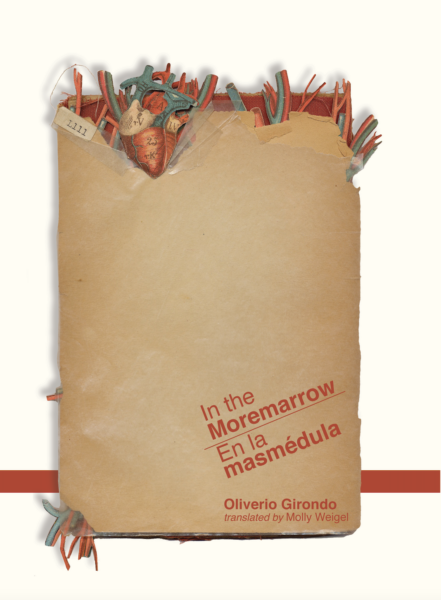
Paul Cunningham: When did you first begin translating Oliverio Girondo’s poetry? What drew you to his work?
Molly Weigel: I first heard of Girondo when I was translating the poets of XUL Magazine in the 80s and 90s. He was one of their founding fathers, and the XUL poets I knew clearly felt deep affection for him, in a way I found moving and uncommon. There was an entire XUL issue devoted to him. I first heard In the Moremarrow spoken of as a work that was untranslatable, which made me curious to know if it really was or not, and what that might even mean. I began translating poems from Moremarrow in 2004, and was immediately struck by how lyrical they were—not what I had expected from a work that had a reputation for being so experimental and difficult. The work’s combination of lyricism and experimentalism beckoned, invited me in, to find out what more was in or beyond the marrow, the core. I spent several years traveling in, deeper and deeper.
PC: What challenges did you face translating Girondo’s In the Moremarrow? Is there a particular passage from In the Moremarrow that you’re most proud of?
MW: Moremarrow’s language is uncompromisingly indeterminate. Portmanteau words have uncertain constituents; parts of speech and noun referents are ambiguous; key repeated words have several meanings, or no known meaning. Grammatical forms are fractured. Words and phrases may thus join with each other in more than one way, creating an irreducible instability. Yet this poetry is also song, sound, feeling, and spell. Girondo breaks the language into small indeterminate units of meaning and recombines them, or allows them to recombine, not mechanically, but with passion, music, humor; with desperation and anger; with an attunement to poetic tradition. While translating, I needed to attend to the poems’ intertwined language and heart. I needed to take apart the already taken-apart Spanish and let it be multiple in Spanish and English, then let it re-form in English as a new but related unstable entity.
A short poem that demonstrates some of the challenges of translating this work (which are easier to briefly summarize in this poem than in many others) is “Oozings.” Here are the first few lines:
The watersheds the orbits have lost the earth mirrors arms the dead fastenings
oblivion its unseeing tapir mask
the pleasure the pleasure the river-bed their abortions the smoke each finger
the fluctuating walls where wine roots brow each boulder dawn
In translating this, I had a working theory that the verb “have lost” is understood between pairs of nouns throughout many of the lines: that “mirrors” have lost “arms,” “the dead” have lost “fastenings,” “oblivion” has lost “its unseeing tapir mask,” etc. However, the alternative needs also to be considered: that the “watersheds the orbits” have lost all of the following nouns.
Actually, there may be no difference in how I would have translated these lines either way. There would be a difference in the heard rhythm, however—the pairs with an understood verb between them, especially one of loss, creates a rocking rhythm, a sense of back and forth across a gulf. The missing verb itself is a gulf, a presence/absence, that makes the pairings, or their reachings, poignant. The pile-up of nouns without verbs linking them, a bewilderment of enumerated losses, would create a more continuous (paradoxically linear) rhythm.
Either way, in the Spanish, the adverb “donde” (where) followed by the verb “amanece” (dawn) in line 4 breaks into the progression. Here I made a choice to emphasize a pile-up of words, some nouns (wine, boulder), and some that could be verbs or nouns in English (roots, dawn), even though “dawn” is the only verb in the line in Spanish, and can be only a verb, not a noun. In my version, in the fluctuating walls, wine could root the brow and each boulder could dawn, or the walls could be the place where the wine, roots, brow, boulder, and dawn exist. I did this because my sense was that the rocking rhythm of shuttling between nouns pauses here and piles up in an indeterminate intermingling ardor. Even the tenuous understood syntax has broken down, or surrendered. The walls themselves fluctuate to allow this shifting meaning to occur. This was my way of honoring both the indeterminacy of Girondo’s syntax and the lyric feeling I found there.
PC: When translating Girondo, you used an approach called “middle version” translation. For those who might be new to this title, what can you tell us about this unique approach to translating?
MW: I developed the “middle version” in response to the challenges the language of Moremarrow presented. The process evolved organically and was what seemed to need to happen. With each poem, I made a working version that contained all the possible meanings I along with the dictionary or thesaurus or internet could think of, both in Spanish and English, including sound quality, threads of meaning, ambiguity of syntax or reference, odd glancing notions.
I came to think of this middle version as three-dimensional, containing, not all the possible directions of the poem, but as many as I could find. It is not a formed, determined poem that has arrived at a (temporary) resting place—yet it informs both Spanish and English versions and is present with them. This middle version is exploding with meanings and sounds, and straining toward resolution—or its translator or readers are. I’d be patient, leaving this version for a while and letting it work on me over time. Then, though the middle version continued to float or hover over the enterprise, I’d eventually give myself the satisfaction of settling into a version I’d call finished—the satisfaction of simultaneously exerting control and receiving Girondo’s language in all the ways that I could.
See the appendix to In the Moremarrow for an example.
PC: Do you have any new projects in the works?
MW: I have translations of Leon Damas, Macedonio Fernandez, Xul Solar, Nestor Perlongher, Jorge Santiago Perednik, and others forthcoming in Jerome Rothenberg’s new anthology on the poetry and poetics of the Americas.
I am assembling a collection of middle versions from the Moremarrow translations which I plan to publish, along with explications, in a separate volume.
My chapbook Catalpa Says is a farewell to a marriage, engaging the landscape of burgeoning meadow and garden to say what has gone unspoken, and to explore what can and can’t be heard, and by whom.
I continue to translate Susana Cerda’s erotic poems.
PC: Who are you currently reading?
The Last Love Poems of Paul Eluard, tr. Marilyn Kallet, Black Widow Press.
A Birder’s Guide to Coastal North Carolina, John Fussell, University of North Carolina Press.
MW: How do you feel about a translator’s visibility versus invisibility?
Hmm. You could say that visibility in translating experimental poetry is inevitable; but you could also say that the language becomes visible through you as translator as through the original. Is the translator more visible in the middle version or the “finished version”? The process of a translator’s engagement with the original and with both languages is more visible in the middle version, although the “final” version paradoxically contains more of the translator’s choices.
Is an experimental translator’s visibility a diaphanous membrane, an intermingled sheen on skin? What fluid seeps from the translator, “joyciferating in the offspawned spring” (Moremarrow)?
PC: What advice would you give to emerging translators?
If you are drawn to a work, let yourself go to it. As you open to it, it will open to you. Intertwined, you and it will travel deeper and deeper into the world that you together create.
Be alert to strangeness or awkwardness in the original, even if it is embarrassing or inconvenient. Don’t try to smooth it out. These irreducible points can be pivots on which the work turns; ways in, out, or around.

Molly Weigel‘s translation of Jorge Santiago Perednik’s Shock of the Lenders and Other Poems received the 2013 PEN Poetry in Translation Prize and her translation of Oliverio Girondo’s In the Moremarrow was shortlisted for the 2014 BTBA (both published by Action Books). She has published poems in Burning House Press, EOAGH!, and The Volta (They Will Sew the Blue Sail); translations in Burning House Press, West Branch, and Mantis; and critical essays in The Volta and Jacket 2, among others.
